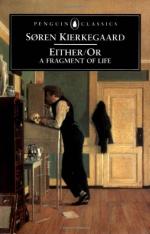
|
| Name: _________________________ | Period: ___________________ |
This test consists of 5 multiple choice questions, 5 short answer questions, and 10 short essay questions.
Multiple Choice Questions
1. What does the author claim the aesthetic is?
(a) The aesthetic is that by which a person spontaneously is what he is.
(b) The aesthetic is a mystery that is fundamentally unknowable.
(c) The aesthetic is that by which a person becomes what he becomes.
(d) The aesthetic is that by which a person spontaneously arouses the essence of someone else.
2. What "humble view" does the author say he presents to the young man?
(a) What it is to prepare and debate.
(b) What it is to choose and repent.
(c) What it is to study and perform.
(d) What it is to hate and destroy.
3. In what does the author say the young man is prolific?
(a) In coining phrases of his favorite conclusions.
(b) In writing volumes of poetry.
(c) In composing symphonies.
(d) In writing novels.
4. What does the author say art and poetry do for us?
(a) Art and poetry torture us with their beauty.
(b) Art and poetry amaze us with the complexity of their construction.
(c) Art and poetry delight us in the moment of consummation.
(d) Art and poetry bore most of us to tears.
5. What concept does the author of the letter introduce at the beginning of this section?
(a) The concept of Either/Or.
(b) The concept of relativity.
(c) The concept of bilocation.
(d) The concept of moral accountability.
Short Answer Questions
1. To what do doubt and despair belong according to the author?
2. What does the author anticipate will be the young man's first objection to married life?
3. How does the author describe the way of history?
4. The author asserts that making a good choice does not depend so much on deliberation as on what?
5. What is the ethical according to the author?
Short Essay Questions
1. What does the author write about "the Moment"?
2. Describe the folktale about Roland's three squires.
3. How may talent become a hindrance to the enjoyment of life, according to the author?
4. What is the relationship between the ethical and the aesthetic?
5. How does the author define philosophy and what does he appreciate about it?
6. What does the author assert is the mystic's error?
7. What are the advantages of the ethical theory of talent as opposed to the aesthetic theory of talent?
8. Are any Either/Or choices absolute? Explain.
9. Why does the author warn against young men being tied down to making a living right away?
10. What risk does the author say one runs when one despairs about something in particular?
|
This section contains 923 words (approx. 4 pages at 300 words per page) |

|




